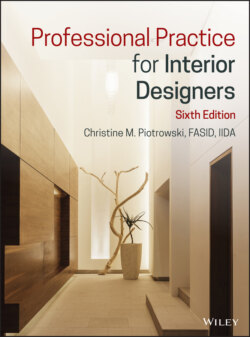Читать книгу Professional Practice for Interior Designers - Christine M. Piotrowski - Страница 34
EDUCATIONAL PREPARATION
ОглавлениеRegardless of whether someone wishes to design residences or become involved in designing any type of commercial interior space, strong educational preparation should be considered mandatory. Owners and users of interior spaces who hire professional help expect the interior designer to have the knowledge and skills to perform the required work with more in mind than aesthetics.
To encompass the range of knowledge and skills development required today, interior design programs are interdisciplinary, drawing from the arts, architecture, and human ecology. It is also important for students to have coursework in business and the liberal arts. Depending on the location of the program and the educational institution, the professional and technical coursework will have a slightly different focus.
The Council for Interior Design Accreditation (CIDA), with assistance from the Council on Interior Design Qualification (CIDQ) and the Interior Design Educators Council (IDEC), and funding from the key professional organizations, has helped to research the common body of knowledge and skills needed by competent professional interior designers. The complete listing of the elements of this body of knowledge is available at the Web site www.idec.org.
Whether a two‐year program at a community college, a three‐ to four‐year program at a professional school or university, or a “two plus two” program where a student begins at a community college and finishes a bachelor's degree at a university, in‐depth educational preparation is imperative. In some cases, advanced education is important for an individual's career choice. Teaching requires educational preparation beyond the bachelor's degree. Some specialized areas such as lighting design also benefit from advanced education.
Regardless of the level of degree sought, professional educational training in interior design must provide the student with the theory and skills of the profession, as well as with the general education required in the 21st century. The focus of that training must also meet the student's interests, abilities, and career goals.
